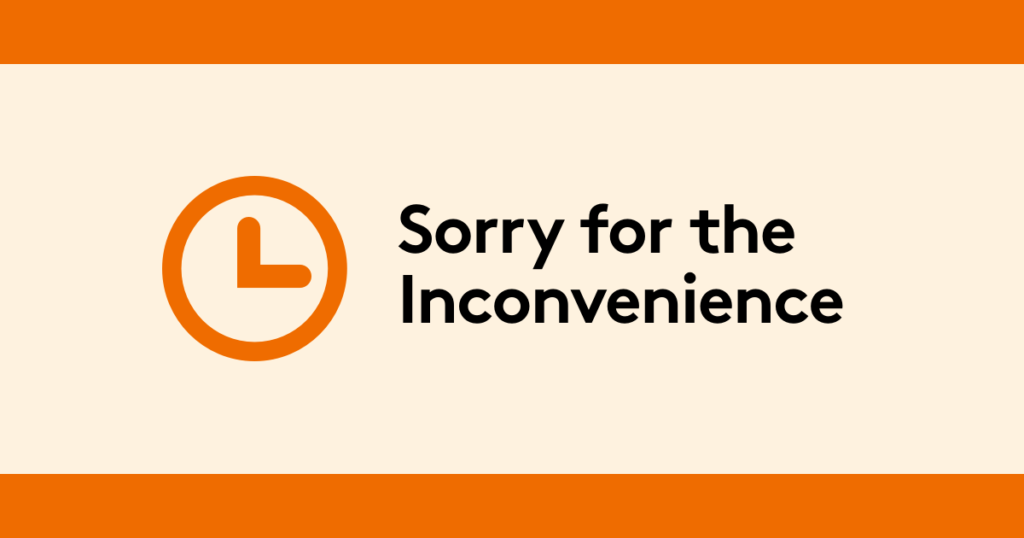
How often have you used the phrase sorry for the inconvenience? Did you know that while well-intentioned, this phrase can come across as insincere, impersonal or robotic?
Thus, polite alternatives to sorry for the inconvenience are essential, especially when it comes to communication, particularly in professional settings, where apologies are inevitable.
Whether you’re running a business or managing relationships, learning new ways to apologize effectively can help you connect more meaningfully with your audience or clients.
This blog post explores 10 polite alternative ways to say Sorry for the Inconvenience while sounding empathetic, sincere, and human.
Change Up Your Apologies: Here is Why
Imagine getting multiple emails from customer support teams, saying the same thing: “We are sorry for the inconvenience.” After a while, the phrase feels hollow.
Over time, it can seem as if the person or company isn’t really sorry, but just throwing out a generic response to placate you.
In fact, using varied, thoughtful phrases shows that you are truly considering the other person’s situation and taking their concerns seriously.
Whether you’re writing to a disgruntled customer, responding to a missed deadline, or apologizing for an unexpected delay, changing your approach can transform how your apology is perceived.
10 Polite Alternatives to Sorry for the Inconvenience
Using “Sorry for the inconvenience” repeatedly can make your apologies sound impersonal and robotic. But don’t worry—there are plenty of other ways to express regret while showing empathy and sincerity. Here are 10 alternatives:
- “Thank you for your understanding.”
- “We regret any trouble this may have caused.”
- “I’m sorry for the disruption.”
- “I hope this hasn’t caused too much inconvenience.”
- “I understand how frustrating this must be.”
- “We take full responsibility for the issue.”
- “We’ll make this right.”
- “I sincerely apologize and value your feedback.”
- “We’re working diligently to resolve this.”
- “We appreciate your patience as we fix the issue.”
Now, let’s get deeper into each of these alternatives and explore how they can be used to improve your communication and apologies.

1. “Thank you for your understanding.”
Rather than focusing on the inconvenience, this phrase shifts the emphasis to the other person’s patience or understanding. It is polite, grateful, and less focused on the negative situation at hand.
This phrase acknowledges that something went wrong without dwelling on the error itself, making it ideal for customer service or client communications where you want to keep the tone positive.
Example Scenarios:
- Customer Service: “Thank you for your understanding as we work through the issue. We’re committed to resolving it as soon as possible.”
- Business Correspondence: “I appreciate your understanding regarding the delayed project timeline. We are doing our best to expedite the process.”
This phrase works well because it subtly reinforces the idea that the other party is being patient, which often helps de-escalate frustration.

2. “We regret any trouble this may have caused.”
A more formal way to apologize, this phrase conveys a sense of gravity and responsibility.
It’s often used in situations where something has gone seriously wrong and you need to convey your regret in a professional manner.
Example Scenarios:
- Formal Email: “We regret any trouble this may have caused and are working to rectify the situation.”
- Technical Support: “Our team is investigating the problem, and we regret the inconvenience caused during this time.”
This phrase is especially useful when speaking to higher-ups, clients, or in legal matters where a direct and respectful tone is required.
3. “I’m sorry for the disruption.”
When someone’s schedule, work, or routine has been interrupted, this phrase is perfect.
It’s straightforward, short, and immediately addresses the inconvenience in a way that doesn’t sound overly formal or detached.
Example Scenarios:
- Workplace Apology: “I’m sorry for the disruption this has caused to the team. I’ll make sure we stay on track moving forward.”
- Customer Service: “I sincerely apologize for the disruption to your service and assure you we are working to restore it as quickly as possible.”
Using the word “disruption” instead of “inconvenience” adds variety to your language and keeps the apology specific.
4. “I hope this hasn’t caused too much inconvenience.”
This phrase is empathetic but casual, making it perfect for day-to-day professional interactions.
It acknowledges the other person’s possible frustration but doesn’t dwell on it. You can use this expression in situations where the inconvenience was minor, but still worth an apology.
Example Scenarios:
- Colleague Apology: “I hope this hasn’t caused too much inconvenience, but I had to reschedule our meeting. Let me know when you’re available.”
- Client Communication: “I hope the delay hasn’t been too frustrating. We’re nearly done with the updates and will send over the revised files soon.”
This phrase is effective because it’s conversational and demonstrates thoughtfulness without being overly formal.
5. “I understand how frustrating this must be.”
When someone is genuinely upset, validating their feelings is key. By acknowledging their frustration, you show empathy and indicate that you truly understand their position.
Example Scenarios:
- Customer Service Response: “I completely understand how frustrating this must be, and we’re doing everything we can to get it resolved.”
- Team Leadership: “I understand how frustrating it must be to deal with these setbacks. I’ll make sure we do better moving forward.”
Validation is often the first step in calming someone down, and this phrase does just that while still offering an apology.
6. “We take full responsibility for the issue.”

When mistakes happen, taking ownership is crucial. This phrase demonstrates accountability, making it clear that you are not trying to deflect blame.
It is particularly important in professional settings where trust and integrity are key.
Example Scenarios:
- Business Apology: “We take full responsibility for the delay and will make sure this doesn’t happen again in the future.”
- Customer Service: “We take full responsibility for the error and are already working on a solution to correct it.”
Taking responsibility without excuses shows maturity and professionalism, helping to preserve trust in your relationships.
7. “We’ll make this right.”
Offering a solution is often more powerful than the apology itself. This phrase assures the other party that you are taking steps to fix the issue, which can help restore confidence and goodwill.
Example Scenarios:
- Customer Apology: “We’ll make this right by issuing a full refund and offering you a 10% discount on your next purchase.”
- Team Apology: “I’m sorry for the misunderstanding. We’ll make this right by revising the report and getting it to you by tomorrow.”
This phrase not only apologizes but also shifts the conversation toward resolution, which is what most people want.
8. “I sincerely apologize and value your feedback.”
In cases where feedback is involved, acknowledging the person’s input shows that you’re open to improvement. This phrase works particularly well in situations where you want to turn a negative experience into an opportunity for growth.
Example Scenarios:
- Customer Review Response: “I sincerely apologize for your experience and value your feedback. We’re taking steps to prevent this from happening again.”
- Internal Feedback: “I’m sorry about the confusion, and I really value your feedback. Let’s work together to address these concerns.”
By including a reference to feedback, you’re showing that you’re not just apologizing, but also learning from the situation.
9. “We’re working diligently to resolve this.”
This phrase is useful when an issue is ongoing, and you want to reassure the other party that you are actively working on a solution. It provides comfort that the situation is being addressed and that it hasn’t been forgotten.
Example Scenarios:
- Customer Service Follow-up: “We’re working diligently to resolve the issue and will provide you with an update shortly.”
- Team Apology: “Our team is aware of the issue and is working diligently to get everything back on track.”
By highlighting that action is being taken, this phrase can help reduce frustration during a prolonged issue.
10. “We appreciate your patience as we fix the issue.”
This phrase combines an apology with gratitude. It’s a great way to express regret while also thanking the other person for their understanding and patience. This works well when dealing with long delays or technical issues.
Example Scenarios:
- Customer Service Delay: “We appreciate your patience as we fix the issue. We’ll keep you informed of our progress.”
- Internal Communication: “Thank you for your patience while we sort out these technical difficulties. We’re working as fast as we can to resolve them.”
This phrase adds a positive note to the conversation by appreciating the other person’s cooperation, even in frustrating situations.
Final Thoughts
When you need to apologize, the way you phrase it makes a big difference.
By using these alternative ways to say “Sorry for the inconvenience,” you can express empathy, take responsibility, and offer solutions in a way that sounds more genuine and thoughtful.
Whether you’re dealing with clients, customers, or colleagues, varying your language ensures your apologies come across as sincere, keeping your relationships strong even in difficult times.





